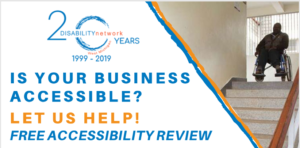 Author’s note: Subject matter could potentially be triggering. Please exercise discretion before reading. If you need support right now, call the National Suicide Prevention Lifeline at 1-800-273-8255, the Trevor Project at 1-866-488-7386 or reach the Crisis Text Line by texting “START” to 741741
Author’s note: Subject matter could potentially be triggering. Please exercise discretion before reading. If you need support right now, call the National Suicide Prevention Lifeline at 1-800-273-8255, the Trevor Project at 1-866-488-7386 or reach the Crisis Text Line by texting “START” to 741741
Written By: Jeffrey Vandyke, Graphics Design Specialist
______
“Let today be the day you stop living within the confines of how others define or judge you.”
It’s that time of year again, time for the older generation to head back to school and for the youngsters to begin their journey. Growing up as a child with a disability, I dreaded this time of year, not because of the homework, assignments, or having to adjust to a new sleep schedule (even though as an adult… I still dread the sound of an alarm clock) but because of the uncertainty surrounding the behavior of my new classmates.
It was almost a certainty; I was going to experience some level of bullying. The only question was, how severe was it going to be? Would it stop at name-calling, side conversation, and snickers as I whizzed my way down the hallway, or would it escalate to something more physical? Were they going to throw things at me or something worse? All in all, you can probably understand why my body was ravaged with thoughts of dread. For many years, it seemed normal, just something that I had to endure, but as I approached adolescence and the bullying intensified, I began to develop a deep insecurity, coupled with thoughts of suicide.
In truth though, I didn’t want to die… I just wanted it to stop (permanently) and I couldn’t fathom the thought of telling my parents or older sister, or teacher; that didn’t seem very masculine or even remotely like a practical solution as my telling would probably make it worse. What choices did this leave? Continue to endure or give up… there was no 3rd option. Thus, I opted for the first, coupled with eventually seeing a counselor post High School to help me manage the lasting effects. In retrospect, I wish
I would’ve sought help much sooner; I would encourage anyone who’s dealing with the same or a similar situation to tell someone you trust. It doesn’t matter who the individual is. Please know that you don’t deserve it, it is not a rite of passage, and your life matters. Please don’t allow yourself to believe anyone who tells you something different.
Bullying is indeed a hot topic in schools and in our society. Unfortunately, according to Pacer’s National Bullying Prevention Center, “Children with disabilities are two to three times more likely to be bullied than their nondisabled peers.” They report that, “One study shows that 60 percent of students with disabilities report being bullied regularly compared with 25 percent of all students.”
Thus, I feel it’s especially important to educate children about disabilities. Children are typically inquisitive. So many times I hear parents shush their children when they ask about someone’s disability in public. It’s not wrong to ask. If they never ask questions and are never educated about disabilities, they will be less likely to try to befriend a peer with a disability.
The fact is as humans, we are conditioned to notice differences. No matter our age, when we see someone using a wheelchair or other assistive device, we notice it. That’s not negative behavior, but instead is human nature. Asking questions opens up a dialog that can help you understand a person on a deeper level. Once we understand our differences, they become less scary. Opening this type of dialog takes you one step closer to understanding and acceptance.
If we can have open discussions with children about disabilities, this helps eliminate the fear of approaching someone with a disability and presents a safe place for them to get their questions answered rather than fanning the flames of stigma. More importantly, it shows them that people with disabilities are not much different than themselves. We all have weaknesses, barriers and things we are self-conscious about, but we are also capable of so much more than we think once we are able to look past those obstacles.
When we take the time to know more about a person, we begin to see them as human beings complete with feelings, flaws, and insecurities, just like anyone else, which is vital to a better more inclusive world for us all. Again, I ask as the school year begins, please take the time to educate your child about disabilities.

 Author’s note: Subject matter could potentially be triggering. Please exercise discretion before reading. If you need support right now, call the National Suicide Prevention Lifeline at 1-800-273-8255, the Trevor Project at 1-866-488-7386 or reach the Crisis Text Line by texting “START”
Author’s note: Subject matter could potentially be triggering. Please exercise discretion before reading. If you need support right now, call the National Suicide Prevention Lifeline at 1-800-273-8255, the Trevor Project at 1-866-488-7386 or reach the Crisis Text Line by texting “START”